Why He Walked Away From His House Seat
He has chosen to abandon his House seat for a greater gamble rather than fight a miserable battle to retain a thankless job. That choice says a lot about priorities, and citizens deserve to understand the tradeoffs. This move shifts responsibility away from local voters toward personal ambition.
Leaving a safe or winnable congressional post for something bigger is a clear bet on name recognition over steady service. Voters elect representatives to show up and represent local interests, not to use the job as a stepping stone. When an incumbent jumps ship, constituents lose continuity and influence.
Campaigning for a higher office consumes time and energy that should be spent on constituent services and oversight. Casework, hearings, and local projects do not wait because someone wants a new title. The practical effect is less attention at the office that still matters to everyday people.
There is also an accountability gap when politicians chase higher ambitions. Running for something else creates a conflict between short-term publicity and long-term results. If the gamble fails, voters end up with neither a leader who delivered nor clear reasons for the gamble.
Financial incentives steer behavior in ways voters should watch closely. Bigger races attract big donors and national money, which changes a politician’s incentives. When fundraising becomes the priority, local needs slide down the agenda.
Look at messaging and media, too. Bold national stunts get headlines and funder attention, while the steady, often boring work of governing is silently undone. That flip from duty to drama is a pattern voters recognize when it’s pointed out plainly.
Party consequences matter as well. Abandoning a seat forces recruitment headaches and can cost the party a vulnerable district. Bench depth and candidate quality are strained when leadership spots are vacated for personal bids. Down-ballot consequences ripple through legislative agendas and committee assignments.
Then there is the moral dimension. Voters expect a certain fidelity to the mandate that put someone in office. Leaving midstream for a higher perch suggests the mandate was treated as a convenience. That undercuts trust in public institutions and in the people who run them.
Another angle is effectiveness. A politician who spends time laying groundwork for a different role rarely builds the long-game relationships needed for real policy wins. Washington rewards consistency and seniority, and recklessly abandoning one role usually means starting over. That inertia is costly to constituents who value results.
Campaign promises promise change, but the pattern of moving from job to job looks more like careerism. Voters weary of professional politicians hear the same refrains: ambition, vision, and destiny. What voters need is accountability and tangible progress, not ambition dressed up as service.
We should also consider the optics for public service. If talented people treat elected office as a temporary stop rather than a duty, fewer committed public servants will stay. That temptation to treat positions as resume-builders repels people who want to serve without the spotlight.
Ultimately, the decision to abandon a House seat for a bigger gamble is a statement about priorities. It raises questions about whether the politician prioritized personal elevation over the steady, often thankless work voters hired them to do. A healthy democracy deserves representatives who choose service over spectacle.

